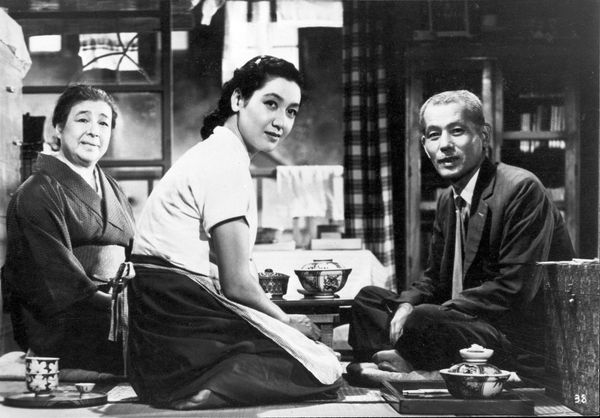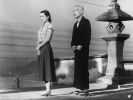Eye For Film >> Movies >> Tokyo Story (1953) Film Review
Tokyo Story
Reviewed by: Scott Macdonald

I've found myself fascinated by Forties and Fifties Japanese cinema over the past few months... Akira Kurosawa's films have been a constant source of joy, with the genre-bending Rashomon, the deeply felt and brilliant Ikiru, the exciting Samurai films.. and the famous Hidden Fortress (one of the inspirations for George Lucas in Star Wars) with his innate mixture of Western storytelling, and quintessential skill of making his films unique and memorable among filmgoers. Further to my reading on Japanese film, Yasujiro Ozu was recommended next.
Throughout the many essays on Ozu, the one word that kept cropping up was "universal". Tokyo Story is a film that can work for any audience, since the story is told so simply, the acting is concise and much is revealed through body language, eyes, and subtle movements in the face. Tokyo Story tells of two old people who visit their sons and daughters during a trip to the suburbs of Tokyo. They visit relatives, friends and a frightfully noisy hotel, then return home. Shortly afterwards, the elderly woman dies, and it's time for the children to make a visit.

I love Ozu's static camera. Here are these characters, focus on them and nothing else. His choices of angles stem from the piercing need to look directly at the characters, while conversing, he blatantly ignores the line of sight rules, and forces the audience to become active, as part of the conversations. The shots are perfectly composed, and leisurely edited together, allowing a few seconds before the actors enter the shot, and a few seconds afterwards. This is due to the nature of his story - it's a slice of everyday life, skillfully and above all simply told. Tokyo Story mirrors our own life, the emotional distance we keep from our parents, our hopes and dreams for the future. It works on so many levels and in such universal ways - the generation gap, conflicts of work, friends and family, aging, inevitable loneliness, and on and on. It's a heartbreaking film. I look at Tokyo Story, and I see moments of my own life, or potential future life reflected.
"Life is such a disappointment."
"Yes."
At the point at which these simple two lines are delivered, it shatters the audience. Simply written, precisely delivered, and brilliant beyond belief.
Ozu's choices of imagery resonate with real depth. The generation gaps in the family is impossible to dispel, from the two grandparents always sitting together some distance from their children and grandchildren, to the distance between the grandmother and the youngest child playing in the grass.
Japanese houses are simply wonderful for Ozu's style, the multiple sliding doors, long hallways, stairs, and the multitude of little rooms linking shots connectively through space. Another interesting image is the repeated use of tombstones as a stairway to heaven. Ozu's use of filmed angles and the repeated imagery, the intermediate shots, which some refer to as "pillow" shots, give the audience a few moments to orientate themselves and prepare for the ongoing storytelling. This is because Ozu's Tokyo Story is the gentlest of things, serene, and sincere. Not without light comedy, or even some gentle irony, but never dares step into cheap melancholic sarcasm. It respects it's characters and audience too much for that.
Reviewed on: 27 May 2007
















